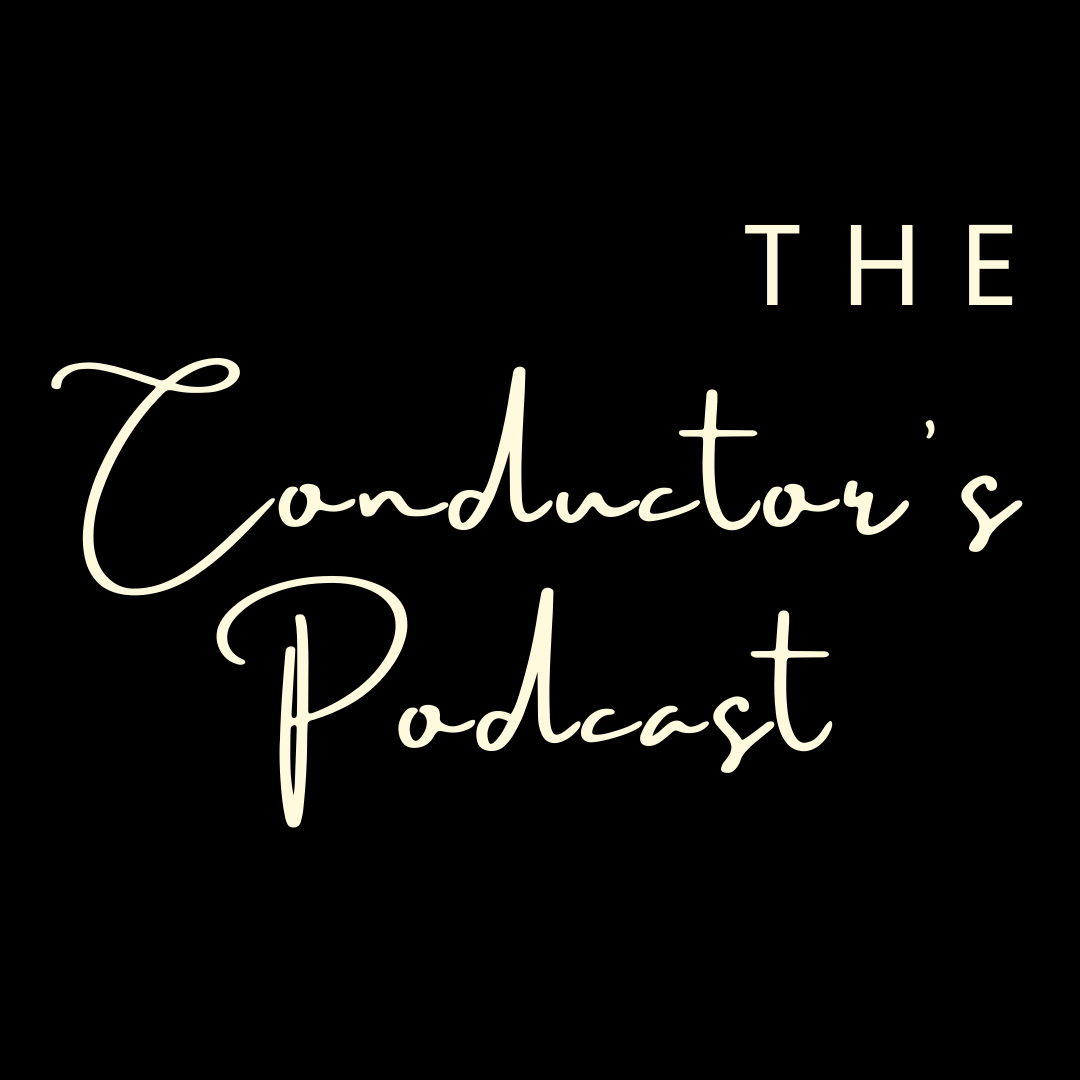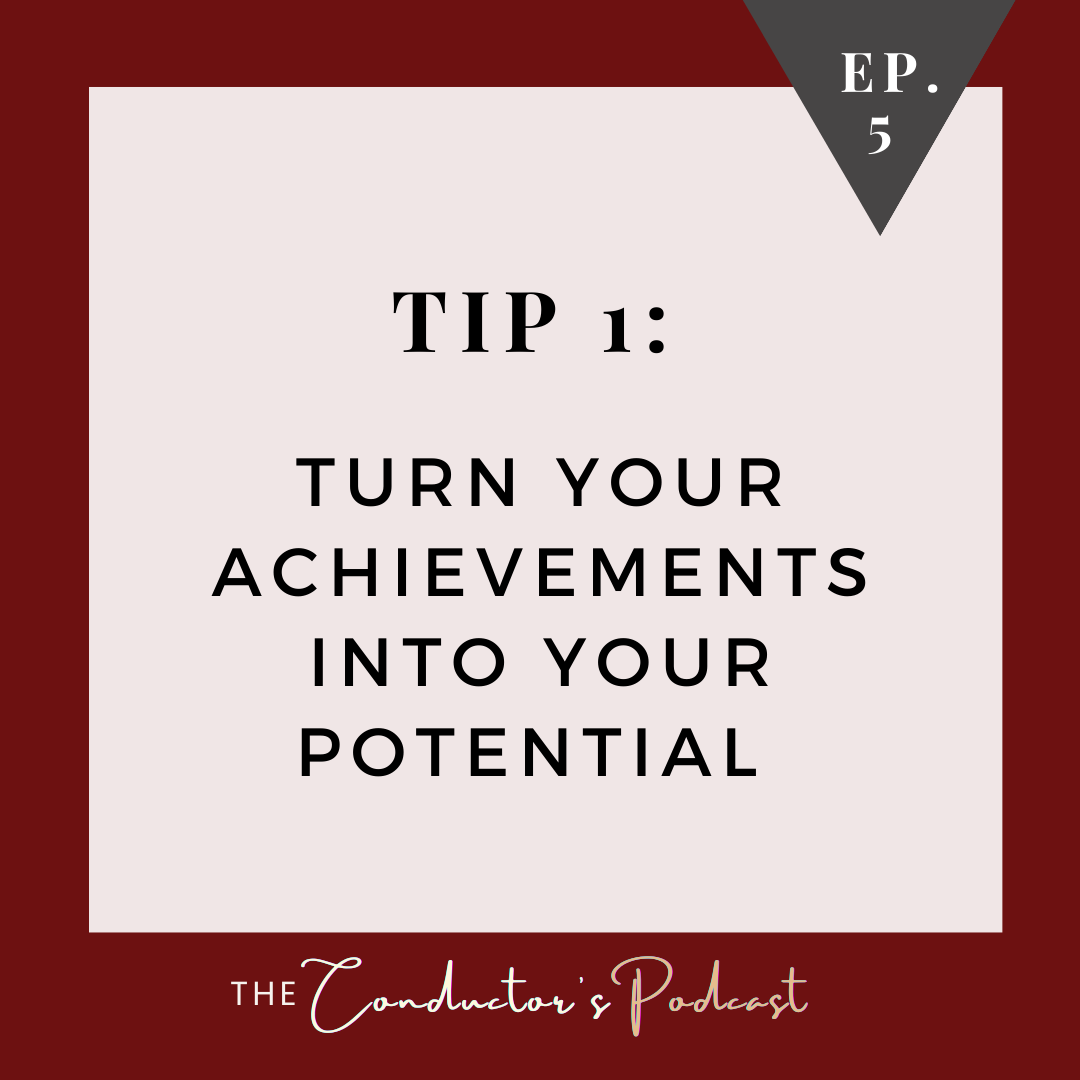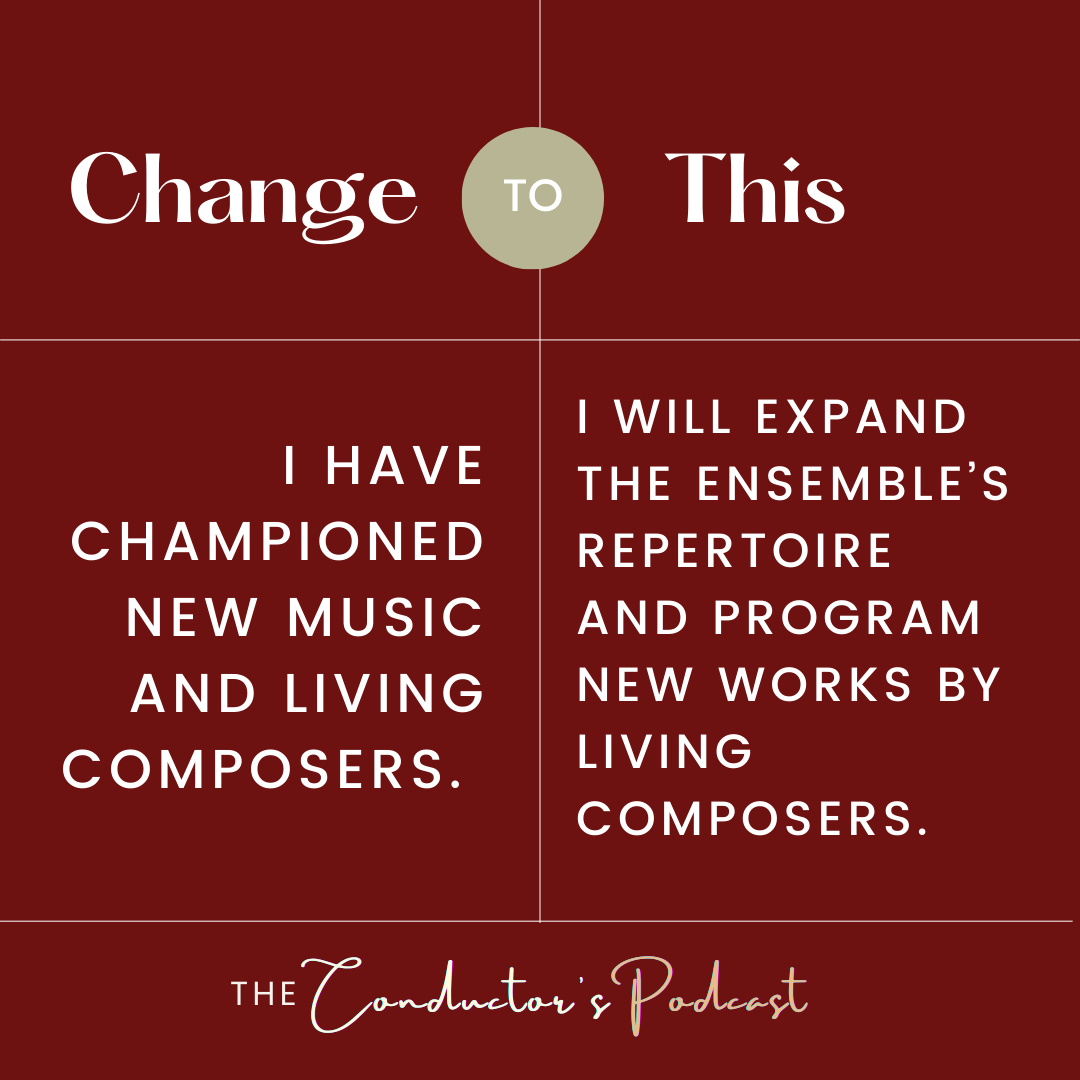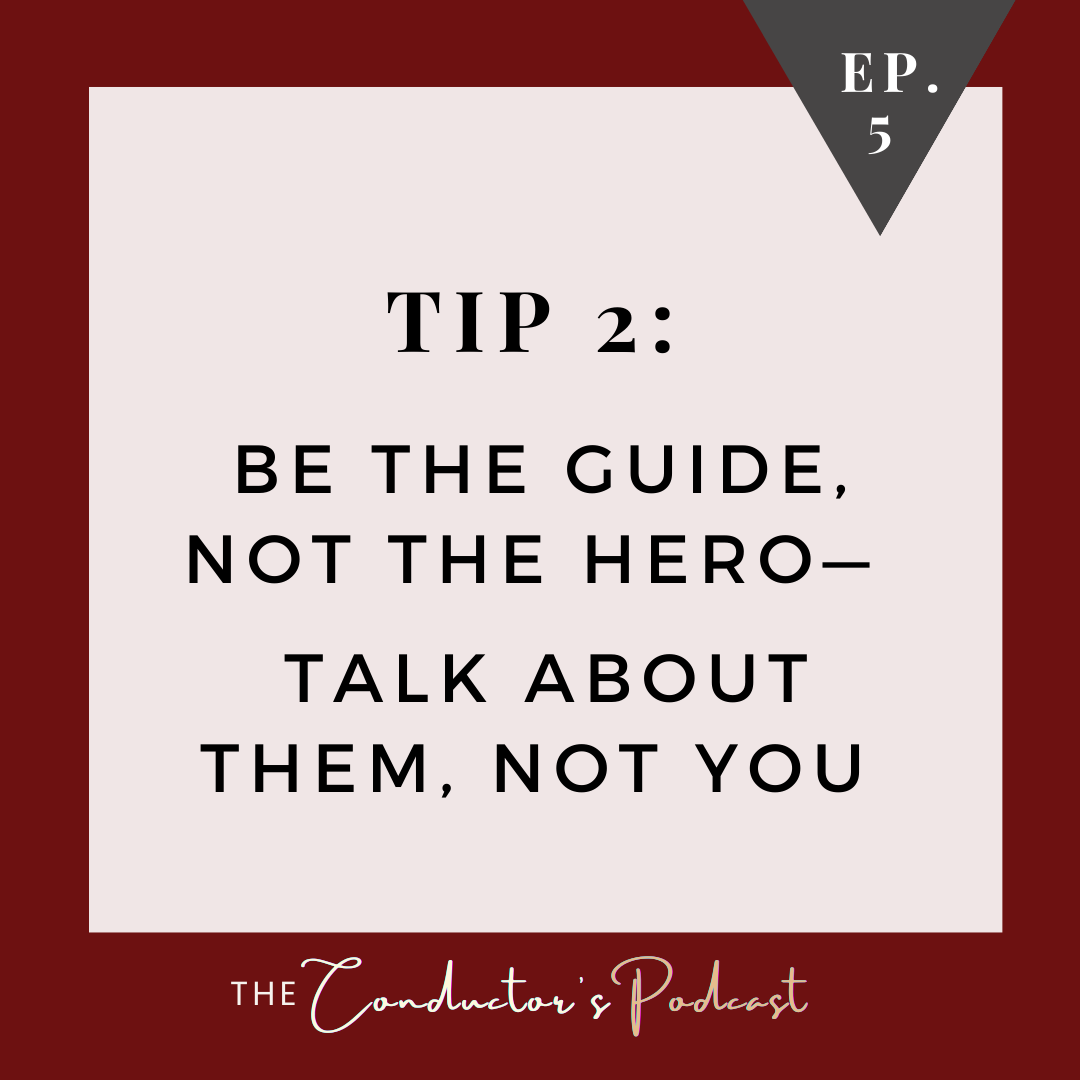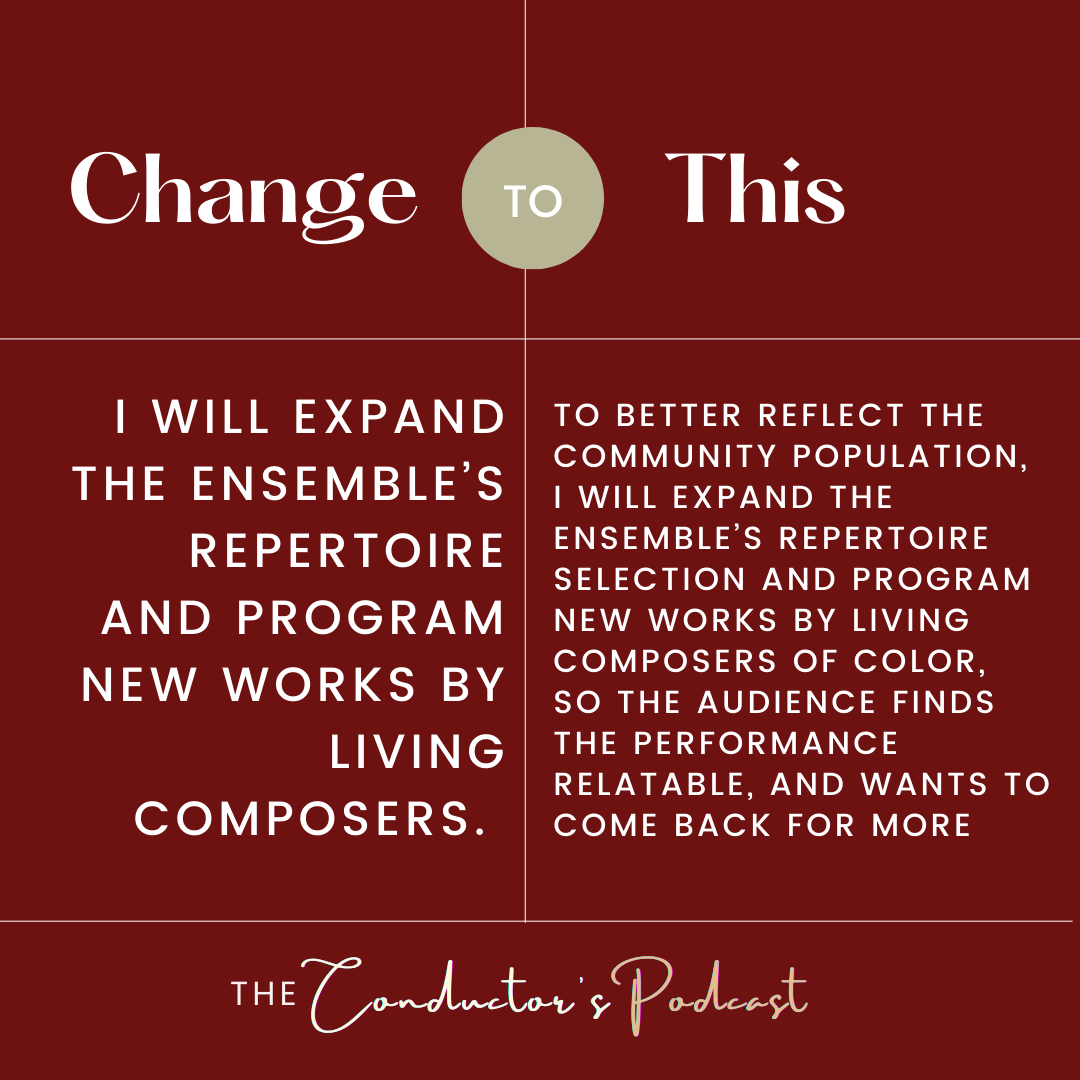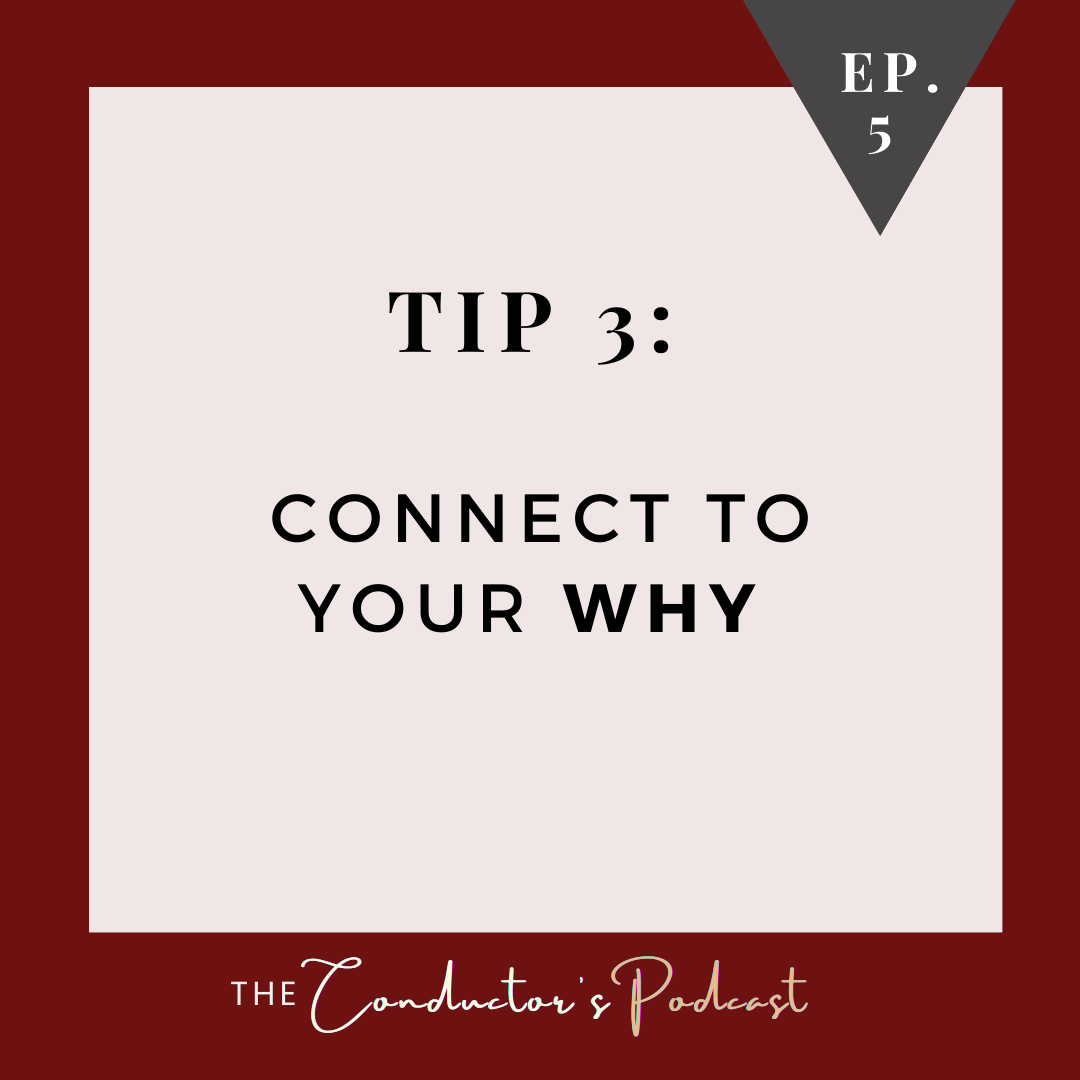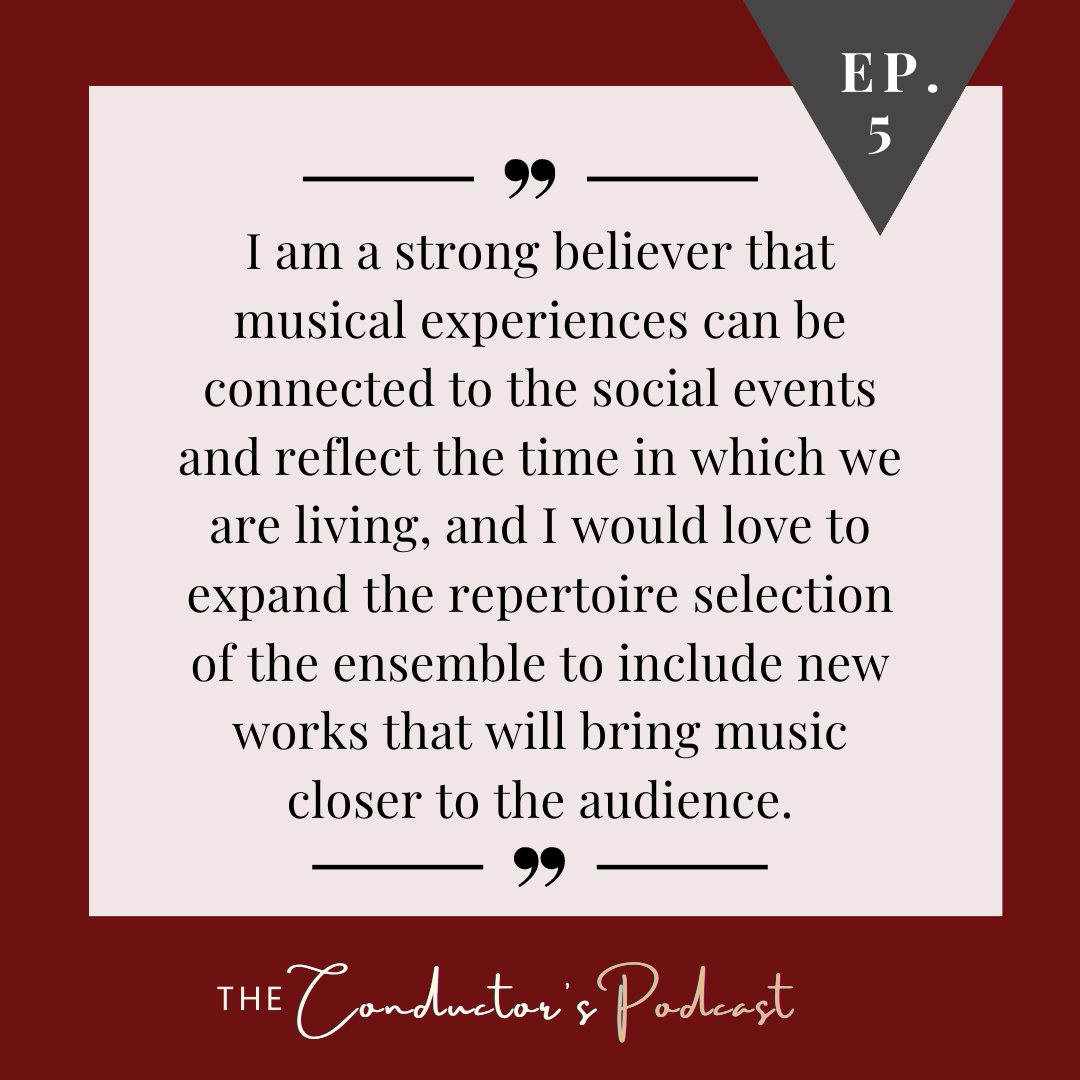Show Notes:
Ready to perfect your cover letter and personal statement?
In today’s episode of our podcast, I’m going to share 3 tips for writing a killer cover letter.
Before I implemented these tips myself, I would consider it a lucky day when I got a rejection letter from fellowship programs or jobs, as most days I would only hear crickets — no response at all to my applications.
So today I am going to open up to all of you, and share how I went from all rejections to being a finalist for 3 positions – and winning 2 – in just three months.
I will not only give you the tips but also share many many examples with you.
Links Mentioned in Today's Episode
Hi everyone, this is Chaowen recording in May 2023.
After finishing the first season of the Conductors podcast, I have decided to give this podcast project a dedicated website with more user-friendly functions. So now we have a brand new website called theconductorspodcast.com. And now we also have its own Instagram handle, it’s also the same, the Conductor’s podcast. So older show notes have been moved to the new site and I invite you to come check out all the resources and happy listening.
The three tips for writing a killer cover letters are, one, change your achievement into your potential, two, be the guide, not the hero, and three, connect with your why.
Hey there, welcome to the Conductors podcast. I’m your host Chao Wan Ting, a conductor with over 20 years of experience working with professional symphony orchestras, opera houses, new music groups, and vocalist. I’m also the founder of Gross Who Conduct and have mentored hundreds of conductors from across the globe.
I created the Conductors podcast to share all the behind-the-scenes secrets with you while I interview conductors, musicians, and business groups from around the world. This is a space created for conductors, conducting students, musicians, and non-musicians who are curious and interested in learning more about the profession, craft, industry, and business.
Shying away from the real talk? No way. Money, hardship, growth, and the rollercoaster of a conducting career are all topics we discuss here. I will give you simple actionable step-by-step strategies to help you take action on your big dream, move through the fear that’s holding you back, and have a real impact.
Now, pull up a seat, make sure you’re closing, and get ready to be challenged and encouraged while you learn.
Hi there, welcome to episode number five of the Conductors podcast. I’m your host, Chowentine, and I’m thrilled that you’re tuning in with me today as we have a great show full of tips for you. In today’s episode of our podcast, I’m going to share three tips of writing a killer cover letter.
Before I implement this tips myself, I will consider it a lucky day when I got a rejection letter from fellowship programs or jobs, as most days I would only hear cricket. No response at all to my applications or inquiries until I noticed a friend of a friend announcing they’ve won the job that I applied for, or that they have been named a finalist for a certain position. And trust me, I know this is really hard and frustrating.
Most of the time, I didn’t get any feedback on the application. I had no idea how to improve the materials, and I was too embarrassed to ask other friends who had advanced in the process, also fearing that no one would share with me because we are in competition with each other all the time.
So today, I’m going to open up to all of you and share how I went from all rejections to being a finalist for three positions and winning two in just three months.
Before we dive in, I have a favor to ask. If you’re listening to this podcast and are loving it, can you please share it with just one friend? No matter if it’s a fellow conductor, a musician, or even a family member who would be interested in knowing more about this profession, you can send them a DM, a text message, or tag me on social media. I’m at Ting Chaowen.tongchaoen.com. You can find my Facebook page at ChaowenTingConductor.
Okay, now let’s talk about cover letters. And as always, you can find all resources and a show note at ChaowenTame.com.
The cover letter can sometimes be called a letter of interest, a motivation letter, or a personal statement. You are always asked to provide one when you’re applying for a job, for a fellowship, a training program, or sometimes even a competition. No matter what it is called, you’re going to tell the potential employers, teachers, or program coordinators a little bit about you, and why you’re applying for this position.
You need to convince them that you’re the best candidate for this opening by showing them what’s unique about you. What sets you apart from other candidates and why they should bring you on as a part of their organization for the coming years.
Now an honest word. The cover letter doesn’t always weigh the same in a selection process. From my experience, it’s really important and weighs much more when you’re applying for a job or a fellowship program, and tends to be less important when applying for a competition or a graduate program. However, this really depends on the organization and the people running the selection process.
But the statement is still really important for two good reasons. One, this is your chance to show who you are in your own voice. The resume and the conducting videos, which are often the other parts of the application materials, say something about you for sure, but your letter or statement is really the place where you can fully flesh out your ideas and personality and tell your story.
Number two, the cover letter is often where the organization’s non-musicians get to know you in the first place. There are often a mix of musicians and non-musicians on the search committee, and this is the stage where you shine, and they might not know the video evaluation process that well.
Through your own words in your letter, you are presenting yourself to the general public, to communicate your ideas and to persuade people into supporting your mission. So you really want to craft a nicely tailored letter to each position that you are applying for.
In the very first episode of the podcast, we talked about how a selection process is usually wrong. If you missed it, just go to chaowonting.com.com. I will link it in the show notes, but you can always find it on my website.
Now, we have some good understanding of the selection process. Let’s talk about the letter itself. Before we dive into the three tips of writing a killer cover letter, I wanted to make sure that we cover the basics of good writing practice.
The first basic rule is to really do your homework and research and study the organization and position that you’re applying for. The best letter thoroughly demonstrates why you are the best candidates for this position.
In rule number two, your writing has to be perfect. There should be no typos or grammatical errors. In a statement, you have an introduction, a body, and a conclusion. And there is a topic sentence followed by supporting details in each paragraph.
In the cover letter, you follow the business writing format of placing the date and address the date at the top with proper greetings at the beginning and the end of the letter.
Basic rule number three, make sure that you proofread, proofread, and proofread. If you have friends who are good writers, buy them some coffee or bagels and ask them to read your letter for you. Or you can hire a remote copy editor to correct your draft. As a non-native speaker, I have a couple editors that have used based in the UK and the US, and they charge from $5 per document to $50 an hour. I use them interchangeably depending on the application and how tight my working time friend is. When
I can, I try to get at least two more opinions than my own before sending a letter out.
You also want to read it out loud. I know this sounds weird, especially if you have roommates or a leaf with your family, but it is really important that you feel and hear how your letter sounds in your ear. And if you use the template and just change details of the name of the organization, make sure you send out the correct version. I have heard more than one story of people accidentally sending about a letter addressing organization A to organization B, and that is more than embarrassing.
Now we’ve talked about the basics. Let’s dive into the three tips of writing a killer, cover letter, and personal statement.
**Tip number one:** Turn your achievement into your potential. A lot of people only talk about what they have done in their statement, as opposed to showing what they can and will do. Yes, we understand that it is easier to talk about your past achievement. You’re definitely building your credibility when you talk about what you have accomplished since they are what brought you to where you are now.
However, the search committee will already be reading your resume, so you don’t want to just have a prose version of what’s listed there. Moreover, organizations want to know that they are hiring or getting someone that not only has a good record, but also has great potential to grow. So how do we turn achievement into potentials? It’s really easy. You just need to flip your narrative from past tense to future tense. Here is an example.
Instead of saying that you have championed new music and living composers, you say that you well expand the composer’s repertoire and program new works by living composers. Here’s another one. Instead of saying your rehearsals were always fun and enjoyable, but also musically challenging, say you well run rehearsals in an enjoyable and fun manner while challenging the musicians musically instead of listing the concerts that you have conducted with Ensembles ABC and D, say that through your past conducting engagement with Ensembles A, you have created two education concerts for four to six graders following the state standards. That can be programmed through the organization’s educational and outreach program.
Are you starting to see a pattern here? The trick is you change the past tense event into something that you are going to do for this organization which you are applying to. To transition this better, you can always provide context, giving a short answer to show that your potential contributions are purposeful and you are bringing in something that suits the needs of the organization. And this is only the first step.
**Tip number two:** Bringing yourself to be the guide, not the hero. Donald Miller talks about this similar concept in his story-branding coaching. Then you want to be the guide, not the hero. In other words, you want to position yourself to be the guide helping the hero to achieve what they want to achieve.
We just talk about examples on changing the narrative from past tense to future tense. But you know, we don’t want a candidate that only cares about themselves, who focuses only on their own accomplishment. You see, in an opening, usually there will be a lot of cover letters that read lightless.
Hi, my name is Chao Antin and I’m a conductor. I went to so-and-so schools and studied with big name A, big name B and big name C. I attended workshops and master classes with teachers XYZ and have conducted Ensembles 12345. Your organization is wonderful and I really need a job, so please pick me as your next conductor. That sounds terrible, right?
So the most important thing in this step is to really research the organization and the position well. Try your best to understand who they are looking for to fill it. You’re going to Google anything you can find out about this position and the ensemble. Either something officially posted or shared by someone else, a journal article to an interview recording.
You can also look up their roster, see if there are any musicians that you might know or if you have a friend or acquaintance affiliated with them. You definitely want to reach out and talk to friends or friends if they have insider knowledge. You want to try to find out as much as you can about this position and the organization.
Then, you are going to read between the lines of the job description very carefully. Do they want an assistant conductor that will do anything that they ask? Do they want someone with a wide skill set that can call the score, conduct an off-stage band, give pre-concert talks, conduct a kids show, create an outreach concert and also speak with donors? Are they looking for someone with strong leadership skills and artistic vision? Does the current administrative team, meaning the chair of the board, the executive director and or the music director, need an artistic leader, a partner or just an assistant?
What are their biggest struggles? Are they wanting to reach out to broader audience demographics? Are they trying to expand their repertoire selections and be more diverse and inclusive? Are they trying to keep their major donors who might be very conservative and happy? Do they want to reach out to more kids, students or young adults? Are collaborations with other performing arts organizations a part of their goals? Are they trying to fill the house or retain their major donors?
For a collegiate conductor position, you might want to find out whether they are struggling with recruiting or retaining students. Do you need to also teach conducting or any other academic courses? Do you need to supervise student workers or graduate conducting students? If this is a 10-year track position with an R1 institution, how much research are you expected to do?
When two major areas are listed under one position, find out their primary need. Do they want a vocal coach that can play for many voice studios or a volunteer who can teach all string courses and recruit while also knowing some conducting? These are just some examples and we will talk about collegiate positions in another episode. But I wanted to give you some ideas about what you want to find out about any job opening. And you’ve guessed it, the answer is, as much as you can, the more, the better.
After you have all this information, you want to continue improving your pitch that will work through the first tip. So if you say you will expand the Ensembles repertoire and program new works by living composers, you can add that. To better reflect the community population, I will expand the Ensembles repertoire selection and program new works by living composers of color. So the audience finds the performance relatable and wants to come back for more.
And you can also elaborate on our previous example on rehearsal strategy, especially for a community ensemble like a church choir, a community band, or a youth orchestra. You can expand on the idea that you will run enjoyable and fun rehearsals too. I understand the musicians have different abilities and we want to make sure that the players at all levels feel welcomed while having a chance to continue growing.
I will run the rehearsals in an enjoyable and fun manner while continuing to develop the ensemble through a balance of challenging and achievable repertoire. Even if you are less experienced and have only worked on a few projects, you have more credential than you think. And you can still translate your experience into something that would be valuable for the organization.
For example, if you have organized an ensemble for your own graduate recital, you can elaborate on this achievement and say that you have experienced recruiting,
can help administrative duties, or have done PR and marketing works in the past. Don’t lie about your experience though. And don’t say things that are untrue. But you can always turn your experiences into something that would be supportive to the specific organization and the ensemble that you want to work with.
Now, I’m sure you are starting to see the pattern queue. You want to not only turn your achievement into your potential, but you are going to go one step further to address how your qualifications will contribute to the position or organization that you are applying for.
Next, connect with your why. Tell your story with your brand. The last step is the most important one, as you want to stand out from other applicants. There will be a lot of fellow conductors equally capable of directing the ensemble, who have nice credentials and perhaps went to better schools or have studied with bigger names than you and can do everything that you just mentioned that you can bring to the position.
So why will a committee want to hire you and not them? This is where you tell your story with your brand. Connect all the potentials with your why. Your why is also your niche, your niche, depending on how you pronounce it. Something unique about you that makes you who you are.
There are a lot of marketing strategies or branding exercises that can help you find your personal and professional niche. But think about this this way. Will you hear the word Starbucks? What’s the first thing that comes to your mind? Coffee, right? Probably not tea latte or bakery. When I say Duncan, you would say donut, even though I hear that they actually have good coffee too. When you think of dominance, you think of pizza, even though they also have very good chicken wings. And this is something that you want to embed in your application materials.
When a hiring committee mentions or discusses you in meetings, you want them to have a strong image that connects your name to what you do. I know this can be hard when you are just starting out. To be honest with you, I felt totally stuck and very frustrated trying to find my own niche the first 10 years of my career.
I kept asking myself and my friends when I had a chance, why isn’t it enough to just be a good conductor? Why can’t I just love classical music and orchestra and be great as what I do? And why do I really need to find a brand to represent myself when I don’t feel that’s really me? The truth is, it takes time to find your niche. It takes time to practice finding it and also time to search for it. And it has to be something genuine to you. You have to be authentic with what to stand for. This is not something that you can fake through. As our music really is a reflection of ourselves and when you are not genuine and authentic, people notice it right away.
If you are still in the journey of searching for your why, here are a few questions that could help you get closer. Why did you want to become a conductor in the first place? Did you love people and want to share the joy of music with others? Did you love a particular repertoire like new music, the classics, the Russian, the French or anything browns, Lily Balonge or John Williams?
Is there a particular concert experience that touched you so much that it meant you want to become a musician? What is the one thing about this profession that you are so passionate about? What are some other areas or principles that you stand unapologetically for such as social justice, lifting minorities in the profession, reaching out to underserved communities or introducing music of your own heritage to the world?
You want to connect your why with old potential contributions. We want to know your why in a context of how you can contribute to the organization and the position. For example, if your why is to introduce music to little kids, which was something that wasn’t available for you when you were young, you would say, I’m particularly passionate about introducing music to young children, which is why through my work with Organization A, I have developed various educational concert programs, which can expand your current outreach program for elementary students between 3rd to 5th grade, with materials complying with the state music standards.
If your why is diverse programming, you could say, I’m a strong believer that musical experiences can be connected to the social event I reflect the time in which we are living. And I would love to expand the repertoire selection of the ensemble to include new works that will bring music closer to the audience. Another example, if you love and want to champion works by composers from a certain region, here is the opening of my friend Lydia Yankov-Skaya’s bio.
And I’m going to read it for you because it’s so good. Russian American conductor Lydia Yankov-Skaya is a fiercely committed advocate for Russian masterpieces, operatic remedies, and contemporary works on the leading edge of classical music. This statement is so powerful and so clearly in her niche.
Now I hope it’s clear that the three tips for writing a killer cover letters are, one, change your achievement into your potential. Two, be the guide, not the hero, talk about them, not you. And three, connect with your why. I know this sounds easy, but it actually takes quite some practice.
If you are just starting out and don’t have so much to brag about, really think closely about what you have done in your training and studies. If you have organized an ensemble to perform and to practice conducting, you have experienced programming, recruiting players, managing personnel, and probably also with some librarian and administrative duties. You probably also have experience in PR when you told everyone about your performances while you were inviting people to come.
If you have conducted a friend’s recital when they programmed a chamber ensemble piece, you had experience coordinating with other partners, forming meaningful networking relationships, and also supporting various artistic visions. If you have worked for youth ensembles no matter children’s choir or youth band or orchestra, you have experienced reaching out to young audiences, combining teaching and ensemble pedagogy with your artistic planning, and have experienced supporting and leading players of different levels.
If you have only conducted a live ensemble at various master classes or workshops, then you have experience quickly adapting to working with various ensembles effectively or can work on the pressure. You have more experience and qualifications than you think you do and really just look for the positive side of what you have done and turn your experience into the language that the search or hiring committee will be looking for.
One last thing, leverage what seems like your weaknesses into your fortes. If you don’t have a certain experience, don’t try to hide it as people do notice these kind of things. For example, if you have only worked with youth ensembles and you are now applying for a position with a professional organization, you can say, my experience working with young adults helped me understand how to engage with young audience members who are music lovers.
I am eager to contribute and expand our reach to the younger generation by engaging with the community beyond our current patrons. Another example, if you have mostly worked with high schools and you are now applying for a collegiate level position, you can say, though I have mostly worked with high school ensembles in the past, I have equipped myself with necessary skills that will contribute to this position. With my past teaching and education networks, I can go to recruit students for our program, attract the best musicians, and continue to grow the ensemble.
And I do want to mention that this type of public school teaching experience is viewed very differently in different fields. For a collegiate wing band director position, such teaching experience will be an asset in supporting the music education department, which makes you a more well-rounded candidate.
In the orchestral and core world, not so much. You are often not expected to have too much experience when entering a master’s program in orchestral conducting, as this is often considered the first-degree program in the United States. We will have a separate episode talking about applying for graduate programs later this year, so stay tuned.
And one last word, if you are not sure what you are good at, just ask. Ask your colleagues, friends, and musicians that you have worked with, what they think are your strengths and things that you can continue to improve. You might be surprised by their answers.
Okay, my friend, there you have it. I hope these tips and examples will give you some direction and refining your next application package. Hang in there as this is not easy. And remember that very often organizations are looking for the best fit. You might be great at community outreach, but they want someone with experience in front of you, or you are passionate about music education, but the administration wants someone good at handling the administrative duties.
As we talked about last week with Tiffany Chang, do not let the bad outcome defeat you or define you. Not being a good fit for a certain position does not mean that you are a bad musician or a bad conductor. It only means that the hiring committee didn’t find you as the best candidate for the position at this moment.
Next week we will be taking a look at a very particular career path to the podium, which starts with vocal coaching on the piano. If you are ever curious about what an opera coach does or want to learn some tips about learning the operatic repertoire, be sure to tune in next week at the same time, same place.
Again, you can find all the information in the show notes at chao-wen-ting.com. And if you are enjoying this podcast, I would appreciate it a lot if you can share it with just one friend. Go ahead and subscribe to the podcast if you haven’t already. We are available on all platforms from Apple Podcasts to Spotify, Google, Amazon Music, Alexa, and TuneIn, Stitcher, and many more. Take care and bye for now.
